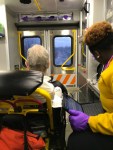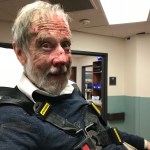The stuff of my imaginings was the reunion and happy hug with Peter after the long, Covid-induced isolation more than three months ago. Less than five minutes after this picture was snapped, the glow was quashed.
I’d visited him isolated behind a large plexiglass shield a week or so earlier and I’d noticed then that he was wearing Crocs, no socks and his ankles looked swollen. His feet didn’t hurt, he said, but then he never has complained.
Carolynn, here the week of our reunion, was thrilled that she could visit her Poppy with me that day. She’s a registered nurse and I’d told her I wanted her look at his feet. We both gasped when I pulled his pant legs up. “This is bad, Mom.” There were oozing sores, one of them the size of a quarter, scattered across his badly swollen lower legs. The skin was red, scaly. Plus-4 pitting and weeping edema, which I’d never heard of, is what she observed. This hadn’t happened overnight. Obviously Peter wasn’t being assessed or treated and we wanted to know why not.
“He should be wearing compression stockings for the swelling, he should have an ultrasound to rule out heart issues, at the very least he should be on Lasix to reduce swelling, his meds need to be checked, and besides that,” she huffed, “his room is filthy!” She was in full charge nurse mode. I asked her take the lead when we talked to the duty nurse. I softened my daughter’s remarks a bit, adding that I knew Peter was responsible for some of the mess and clutter in his room but still, he was the resident in care and the “care” seemed to be missing.
Thus began what turned into more than three months of working through a scrim of excuses and blame. True, everyone, staff and residents alike, had been affected by Covid, but it was apparent that nursing basics had not been followed.
Dementia took Peter’s voice. I found mine.
Even though I detest confrontation, I went on the attack. My mantra became, my husband is not getting the care that more than 7500 dollars per month should ensure.
- I contacted friends who had dealt with a loved one’s dementia-related issues and got their advice. The most pertinent—speak up.
- I made phone calls and when that didn’t get the results I’d hoped for, I wrote to those who were in position to make changes.
- I asked that compression stockings be ordered and when that wasn’t done, thanks to various lame excuses, I bought poor substitutes at CVS. Soon, the preferred brand were ordered.
- I was told, incorrectly, that if I wanted my husband to see a cardiologist, I had to make the appointment. I got the required referral.
- When I questioned some of his meds, particularly those to calm his combativeness, I complained about the zombie affect they caused. I suggested my time-tested calming techniques: a cup of tea and his tv tuned to sports.
There were other issues, but these were most significant and are being dealt with with varying degrees of efficiency.
Roadblocks and excuses every step of the way.
When I was told Covid has changed everything, I agreed. I complimented the good job the staff had done to keep residents safe during the long ordeal. I was sympathetic to their long work hours, short staff and uncertainties both at work and in their personal lives. When I heard, I’m not paid enough to do this, or We don’t have enough staff, I agreed. Easy for me to say, Hire more people, pay them more, offer incentives.
Peter’s legs are somewhat better, though still swollen. The most worrisome ulcer is healing slowly. He’s finally able to smile and joke a bit. That tells me he really did feel poorly, but couldn’t express himself. Who knows how long the condition had festered before my daughter and I let staff know that we knew something was grievously wrong?
I wish I could write a happy ending to this post, but in reality dementia is inherently unpredictable. And I wish I could say that there have been no further issues for me to deal with, but that isn’t the case. Frustrating senseless problems continue. They seem endemic.
The laughs that have helped us traverse this long path have been scarce these recent months. I cling to the tiniest chuckles: Peter was coming along the corridor one day when I walked in. He clutched at his trousers in a telltale way, so I headed him to the bathroom. “I don’t need to go in there,” he growled and pulled two small cans of Coke out of his pockets. I shook my head and laughed. He gave me a knowing look. “Gotcha!,” his smile seemed to say.
Header photo: Clematis hugs our lamp post. The plant symbolizes mental beauty and ingenuity. It climbs trellises and walls, sometimes in incomprehensible ways. Peter has attempted to climb walls too, and just two days ago I caught him stacking chairs in the gazebo! A means of escape? I wouldn’t put it past him.
















